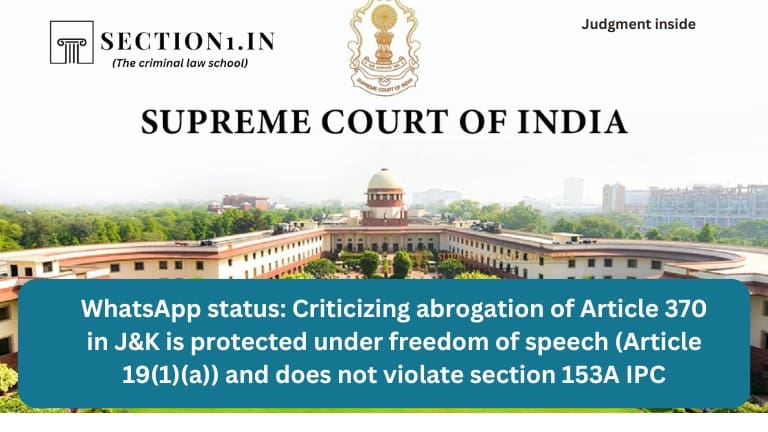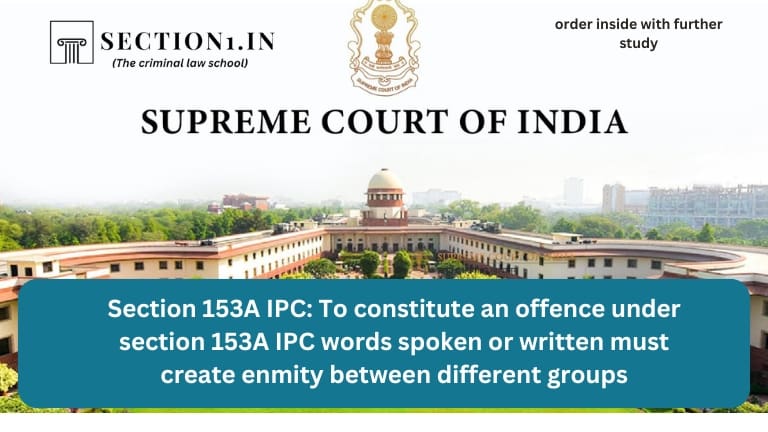Factual aspects
FIR registered under section 153A IPC
1. A First Information Report (for short, ‘the impugned FIR’) was registered against the appellant for the offence punishable under Section 153-A of the Indian Penal Code, 1860 (for short, ‘the IPC’). The appellant filed a writ petition before the High Court of Judicature at Bombay for quashing the FIR. By the impugned judgment dated 10th April 2023, the High Court has dismissed the writ petition.
Allegation is based on the Accused WhatsApp status
2. The appellant was a Professor at Sanjay Ghodawat College in District Kolhapur, Maharashtra. He came to Kolhapur for employment. Earlier, he was a permanent resident of District Baramulla, Kashmir. The appellant was a member of a WhatsApp group. The allegation of commission of offence is based on what was seen on his WhatsApp status. The State Government has set out the precise text appearing on the WhatsApp status of the appellant in its counter affidavit. Clauses (c) and (d) of paragraph 3 of the counter affidavit read thus:
“…. Chat reproduction”
Celebrating Independence Day of Pakistan would not attract offence but other words would
3. By the impugned judgment, the Division Bench of the High Court held that what was stated by the appellant regarding celebrating Independence Day of Pakistan will not come within the purview of Section 153-A of the IPC. However, the other objectionable part can attract the offence punishable under Section 153-A of the IPC.
Consideration of submissions
5. The only offence alleged against the appellant is the one punishable under Section 153-A of the IPC. Section 153-A of the IPC, as it exists with effect from 4th September 1969, reads thus:
6. In the case of Manzar Sayeed Khan [(2007) 5 SCC 1], while interpreting Section 153-A, in paragraph 16, this Court held thus:
“16. Section 153-A IPC, as extracted hereinabove, covers a case where a person by words, either spoken or written, or by signs or by visible representations or otherwise, promotes or attempts to promote, disharmony or feelings of enmity, hatred or ill will between different religious, racial, language or regional groups or castes or communities or acts prejudicial to the maintenance of harmony or is likely to disturb the public tranquillity. The gist of the offence is the intention to promote feelings of enmity or hatred between different classes of people. The intention to cause disorder or incite the people to violence is the sine qua non of the offence under Section 153-A IPC and the prosecution has to prove prima facie the existence of mens rea on the part of the accused. The intention has to be judged primarily by the language of the book and the circumstances in which the book was written and published. The matter complained of within the ambit of Section 153-A must be read as a whole. One cannot rely on strongly worded and isolated passages for proving the charge nor indeed can one take a sentence here and a sentence there and connect them by a meticulous process of inferential reasoning.”
(emphasis added)
Section 153A (1)(a) will apply only when an act committed prejudicial to maintain harmony between religious racial language or regional groups or castes or communities which disturbs the public tranquility
8. Now, coming back to Section 153-A, clause (a) of subsection (1) of Section 153-A of the IPC is attracted when by words, either spoken or written or by signs or by visible representations or otherwise, an attempt is made to promote disharmony or feelings of enmity, hatred or ill-will between different religious, racial, language or regional groups or castes or communities. The promotion of disharmony, enmity, hatred or ill will must be on the grounds of religion, race, place of birth, residence, language, caste, community or any other analogous grounds. Clause (b) of sub-section (1) of Section 153-A of the IPC will apply only when an act is committed which is prejudicial to the maintenance of harmony between different religious, racial, language or regional groups or castes or communities and which disturbs or is likely to disturb the public tranquility.
Criticise the action of abrogation of Article 370 of Constitution of India is simple protest under Article 19(1)(a) freedom of speech and expression
9. Now, coming to the words used by the appellant on his WhatsApp status, we may note here that the first statement is that August 5 is a Black Day for Jammu and Kashmir. 5th August 2019 is the day on which Article 370 of the Constitution of India was abrogated, and two separate Union territories of Jammu and Kashmir were formed. Further, the appellant has posted that “Article 370 was abrogated, we are not happy”. On a plain reading, the appellant intended to criticise the action of the abrogation of Article 370 of the Constitution of India. He has expressed unhappiness over the said act of abrogation. The aforesaid words do not refer to any religion, race, place of birth, residence, language, caste or community. It is a simple protest by the appellant against the decision to abrogate Article 370 of the Constitution of India and the further steps taken based on that decision. The Constitution of India, under Article 19(1)(a), guarantees freedom of speech and expression. Under the said guarantee, every citizen has the right to offer criticism of the action of abrogation of Article 370 or, for that matter, every decision of the State. He has the right to say he is unhappy with any decision of the State.
Intention: Accused did not cross the line
10. In the case of Manzar Sayeed Khan, this Court has read “intention” as an essential ingredient of the said offence. The alleged objectionable words or expressions used by the appellant, on its plain reading, cannot promote disharmony or feelings of enmity, hatred or ill-will between different religious, racial, language or regional groups or castes or communities. The WhatsApp status of the appellant has a photograph of two barbed wires, below which it is mentioned that “AUGUST 5 – BLACK DAY – JAMMU & KASHMIR”. This is an expression of his individual view and his reaction to the abrogation of Article 370 of the Constitution of India. It does not reflect any intention to do something which is prohibited under Section 153-A. At best, it is a protest, which is a part of his freedom of speech and expression guaranteed by Article 19(1)(a). Every citizen of India has a right to be critical of the action of abrogation of Article 370 and the change of status of Jammu and Kashmir. Describing the day the abrogation happened as a “Black Day” is an expression of protest and anguish. If every criticism or protest of the actions of the State is to be held as an offence under Section 153-A, democracy, which is an essential feature of the Constitution of India, will not survive. The right to dissent in a legitimate and lawful manner is an integral part of the rights guaranteed under Article 19(1)(a). Every individual must respect the right of others to dissent. An opportunity to peacefully protest against the decisions of the Government is an essential part of democracy. The right to dissent in a lawful manner must be treated as a part of the right to lead a dignified and meaningful life guaranteed by Article 21. But the protest or dissent must be within four corners of the modes permissible in a democratic set-up. It is subject to reasonable restrictions imposed in accordance with clause (2) of Article 19. In the present case, the appellant has not at all crossed the line.
Words in the whatsapp status was seen by standards of men and women who know the importance of democratic values
11. The High Court has held that the possibility of stirring up the emotions of a group of people cannot be ruled out. The appellant’s college teachers, students, and parents were allegedly members of the WhatsApp group. As held by Vivian Bose, J, the effect of the words used by the appellant on his WhatsApp status will have to be judged from the standards of reasonable women and men. We cannot apply the standards of people with weak and vacillating minds. Our country has been a democratic republic for more than 75 years. The people of our country know the importance of democratic values. Therefore, it is not possible to conclude that the words will promote disharmony or feelings of enmity, hatred or ill-will between different religious groups. The test to be applied is not the effect of the words on some individuals with weak minds or who see a danger in every hostile point of view. The test is of the general impact of the utterances on reasonable people who are significant in numbers. Merely because a few individuals may develop hatred or ill will, it will not be sufficient to attract clause (a) of sub-section (1) of Section 153-A of the IPC.
Independence day wishes to Pakistan is a gesture of goodwill
12. As regards the picture containing “Chand” and below that the words “14th August–Happy Independence Day Pakistan”, we are of the view that it will not attract clause (a) of subsection (1) of Section 153-A of the IPC. Every citizen has the right to extend good wishes to the citizens of the other countries on their respective independence days. If a citizen of India extends good wishes to the citizens of Pakistan on 14th August, which is their Independence Day, there is nothing wrong with it. It’s a gesture of goodwill. In such a case, it cannot be said that such acts will tend to create disharmony or feelings of enmity, hatred or ill-will between different religious groups. Motives cannot be attributed to the appellant only because he belongs to a particular religion.
Educate the police machinery on the concept of freedom of speech and expression
13. Now, the time has come to enlighten and educate our police machinery on the concept of freedom of speech and expression guaranteed by Article 19(1)(a) of the Constitution and the extent of reasonable restraint on their free speech and expression. They must be sensitised about the democratic values enshrined in our Constitution.
Registration of FIR under section 153A IPC is abuse of process of law
14. For the same reasons, clause (b) of sub-section (1) of Section 153-A of the IPC will not be attracted as what is depicted on the WhatsApp status of the appellant cannot be said to be prejudicial to the maintenance of harmony among various groups as stated therein. Thus, continuation of the prosecution of the appellant for the offence punishable under Section 153-A of the IPC will be a gross abuse of the process of law.
Party
Javed Ahmad Hajam … Appellant versus State of Maharashtra & Anr. … Respondents – CRIMINAL APPEAL NO.886 OF 2024 (Arising out of Special Leave Petition (Crl.) No.11122 of 2023) – 2024 INSC 187 – March 7, 2024.
https://main.sci.gov.in/supremecourt/2023/20359/20359_2023_8_1501_51218_Judgement_07-Mar-2024.pdf






3 Comments
[…] WhatsApp status: Criticizing abrogation of Article 370 in J&K is protected under freedom of spee… […]
[…] WhatsApp status: Criticizing abrogation of Article 370 in J&K is protected under freedom of spee… […]
[…] As can be seen from the facts of the present case, there has been a flagrant violation of the mandatory requirements of Sections 15 and 19 of the JJ Act. Neither was the charge sheet against the accused appellant filed before […]